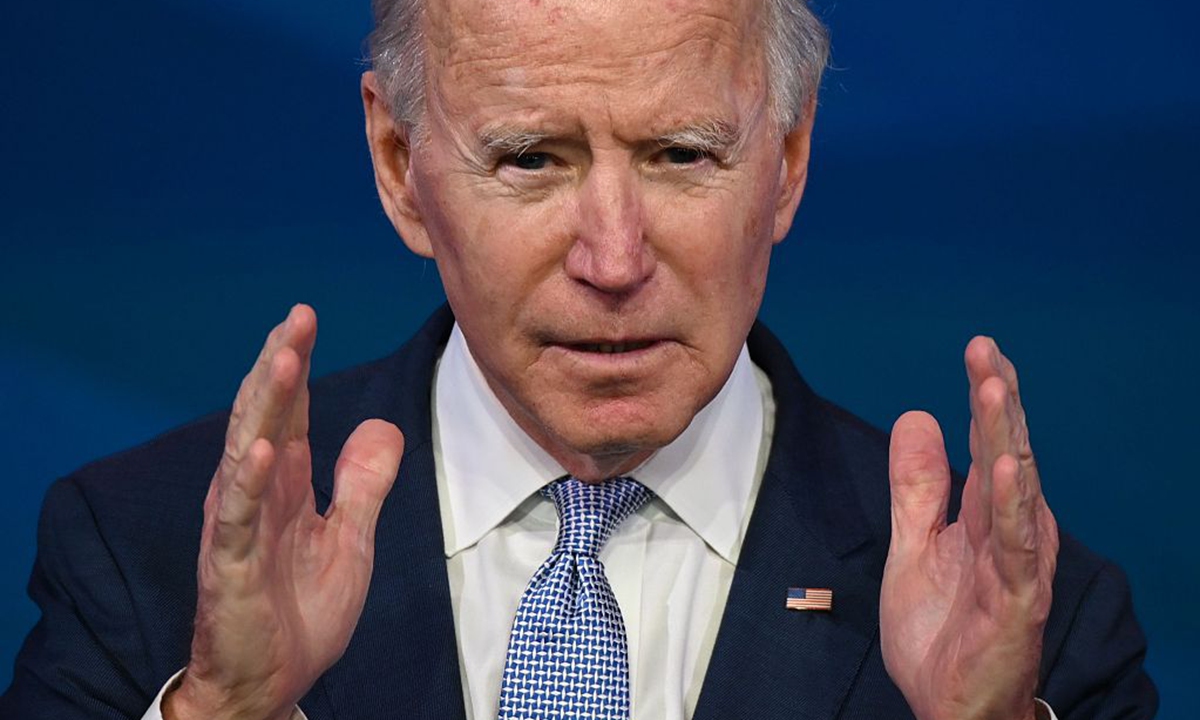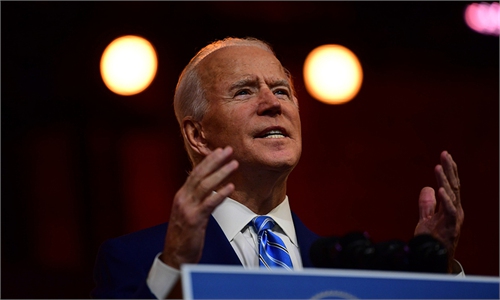
Joe Biden. Photo: VCG
Greater cooperation with China would be an important premise of US President-elect Joe Biden's $1.9 trillion relief package proposal and a second plan, Chinese experts said Friday, envisioning the massive spending plan, if eventually approved, would bode well especially for Chinese exports.Biden unveiled the emergency legislative package on Thursday aimed at combating the COVID-19 pandemic and an economic downturn.
The proposed package is intended to fund a nationwide vaccination effort and an expansion of COVID-19 testing, and ensure sufficient supplies of protective gear, among broad-based measures designed to kick-start the virus-inflicted economy, US media reported.
The $1.9 trillion proposal is more of a rescue plan than an economic stimulus package, which, after it's signed into law, is expected to be largely translated into consumption to benefit China's exports sectors, Gao Liankui, a professor and a member of the academic committee at the EU Business School, told the Global Times on Friday, citing the proposed procurement of medical supplies.
More importantly, as Chinese experts have noted, increasing closeness with China in vaccines and new energy would be a prerequisite for Biden's ambitious spending plans to actually materialize.
Biden has set a goal of 100 million coronavirus vaccinations in his first 100 days in office.
The US is likely to see a shortage of production lines as supplies of vaccine ingredients, such as the nurturing of cells, is time consuming, which might limit vaccine production. It normally takes between a few months and half a year to transform mature vaccine production lines into COVID-19 vaccine production lines, Yang Zhanqiu, deputy director of the pathogen biology department at Wuhan University, told the Global Times in a recent interview.
The plight of vaccine production under capacity, especially considering a huge gap of related medical supplies such as vials and the vaccine cold chain, has some observers calling for greater vaccine cooperation between the world's two largest economies.
New energy is seen as another major area of cooperation as Biden revealed plans to also introduce a second legislative package over the coming weeks, which according to CNN, is "designed to invest in American innovation competitiveness, combating the climate crisis by investing in clean energy jobs and infrastructure, take care of the workforce and the economy."
The US' new energy sector took the lead 20 years ago, but has over the last five years apparently turned out to be a laggard, with relevant industries, especially car batteries, transferred to Asia, Zhang Xiang, an auto analyst, told the Global Times on Friday.
China, Japan and South Korea are the major global powerhouses for car battery manufacturing, while the US is not home to any powerful battery suppliers, Zhang said, noting that the US is not equipped with core industrial chains and resources for new-energy vehicle production, thereby rendering partnerships with Chinese firms a must-have for the US to rev up its new-energy vehicle push.
Tesla's Shanghai factory, where the manufactured cars are shipped overseas, is a typical example of China-US cooperation in the area of clean energy, the analyst said.

